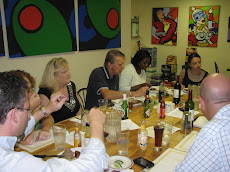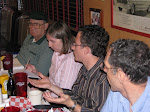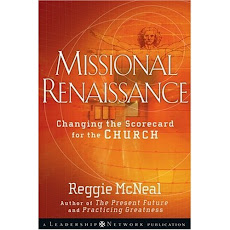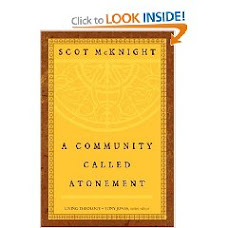 “Relationship is the essence of God…intimacy with God and each other.”
“Relationship is the essence of God…intimacy with God and each other.” – Anthony (
BEC Meetup Member)
(Pictured at right:
BEC Christmas gathering at Robin & Melissa’s)
Twelve of us gathered for our December
Broward Emerging Christians (
BEC)
Meetup at Laura’s Cuban Restaurant in Hollywood to continue our discussion about emerging /
missional ways to do church. We started, as has become our custom, with one of us sharing our story of what led us to the emerging conversation and to this table. This time, Kelly shared. Although it was his first time joining us (due in part to his travel schedule) he offered a unique perspective of having left a local mega-church to start “Epic” which began as, “An Emergent Church Community” in North
Broward, but now prefers to eschew even those labels. You can find out more about Epic here:
http://www.epic-remix.org/Kelly grew up as a missionary kid (“MK”). After spending time in Peru he and his wife settled back in the U.S. in a mega-church and loved it and eventually went on staff. At the same time, he found himself asking questions about what the essentials vs. the non-essentials of the Christian faith are (see also Scot McKnight's discussion on this topic at
http://blog.beliefnet.com/jesuscreed/2008/12/friday-is-for-friends-96.html#more ). And he found through ongoing global missions work that even other missionaries in Africa were asking many of the same questions. These questions involved matters like the Second Coming of Christ, rules related to tithing, expectations of how Christians are supposed to vote, and many others. He questioned the millions of dollars it cost to run the mega-church with its hundreds of staff, compared to the benefits for the Kingdom of God. In the mega-church, the answers were
pre-packaged, and if you
didn’t like the package being offered, there was push back.
Kelly decided that God may be speaking through his questioning, and if He was, he wanted to be listening and push through and not look back later and regret that he
hadn’t. This process of asking, listening and reading is what led him to the emerging conversation. He tried to share what he was learning with leaders of the mega-church and after two frustrating years simply got a firm “no.” Opposition from the mega-church to what he perceived to be a process of spiritual growth led him to “step off a cliff” into bi-vocational ministry in the emerging church movement and to start the “Epic Re-mix” community in North
Broward County, FL. While scary, this move was also exhilarating and allowed him to be part of a community where people were free to ask questions and wrestle with the answers and where it would be OK to disagree. He wonders if that is part of what being “one” means as Jesus describes it in John’s Gospel.
Now, Kelly found less of a disconnect between what he represented to those around him and who he really was. He also found less of a disconnect between the church community and those outside of it. On the one hand, he often observed people outside of church acting like better Christians than those in the church. At the same time, the emerging /
missional church community was freer to embrace those on a journey, without focusing so much on whether they’d “arrived.” In the extreme, he summed up the divide viewed by many of those “inside” the church, compared to those “outside” the church, with this slogan, “Good for us, to hell with you.” This resonated with others in the group. Kelly now no longer felt he had to “sell” something to people and could focus more on authentically loving God and loving others.
Reactions, and more discussion on how we do “church”…Anthony observed that when Jesus was here, “He caused a ruckus” and reminded us of his conflict with the “religious system” to the point of using a whip to drive the money changers out of the temple area. He also said, “Church is not a building. We are church.” And he posed this question to us, “What if we treated each other with the same reverence that we treat sacred temples with?”
Matt, Robin & Steve F. looked for balance and the way forward. Emerging /
Missional Christians don’t look to “attract” to a church per
se but go out to “be” available as the church, as the Body of Christ in the world. At the same time, “Generous Orthodoxy” means we don’t have to get other Christians to stop going to their inherited/institutional churches. But we are available there too to help promote re-
missionalizing or “re-
traditioning” (Described by Phyllis Tickle as staying in one’s inherited church while energetically wishing to make it more fully what it originally was) in the church. The thrust is to broaden the reach and definition of church from 2 hours on Sunday to a 24/7 way of spiritual life (See also Rob Bell’s “Everything is Spiritual”
http://www.youtube.com/watch?v=Poi3imQkQsQ ).
We also need to be careful not to take on an air of superiority in pointing out shortcomings of other church modes, but to be about the business of humbly suggesting and living out solutions.
We returned to discussing Alan
Hirsh’s book
The Forgotten Ways http://www.theforgottenways.org/intro/ in the area of leadership ethos. Here, Hirsch compares post-
Constantinian “
Christiandom Mode,” defining it as “Leadership by institutionally ordained clergy, thus creating a professional guild operating primarily in the pastor-teacher mode” to early church and “Emerging
Missional Mode” where “Leadership embraces a pioneering-innovative mode including a fivefold ministry-leadership ethos.
Noninstitutional by preference.” Are these legitimate
demarcations? We agreed that both modes have always operated in the church but there have been times when one is dominant over the other and that there is often conflict between modes.
The downside of a professional ministerial guild is that it can serve to maintain the power and financial status
quo for the professionals while
withholding significant leadership roles from other Christians. It promotes hierarchical religious systems (similar to those Jesus confronted) including state religion. With such strong systems in place, the Holy Spirit can easily be sidelined without it being
apparent to many.
On the other hand, the benefit of fivefold ministry described in Ephesians 4 (Apostle, Prophet, Evangelist, Pastor, Teacher - known by the
acronym APEPT) is that all Christians use their gifts. Leadership is distributed and church spreads as an organic, grass roots Jesus movement. If a church stays in a box just to survive, it is actually sowing the seeds of its own death. Scott commented that churches often reach only for the safe, for the probable and possible, when we should be going for the impossible.
Finally, Anthony concluded with these thoughts, “Relationship is the essence of God…intimacy with God and each other.” And he asked, “Why does the pastor have to invite people to their home? People should invite people to each other’s homes." Wendy and others agreed and after some discussion, Robin & Melissa did just that and invited us all to their home for Christmas fellowship which was held on December 19
th. You can see some of the comments and pictures here:
http://emergentchristian.meetup.com/29/calendar/9288939/We’ll meet again at Laura’s Cuban Restaurant on Three Kings Day, Tuesday, January 6, 2009 and continue our
fellowship and our discussion of “The Forgotten Ways.”
Peace and blessings this Christmas and New Year,
Steve
 "How does one know that God is good if not through the actions of people who claim to know him and the inactions of those who claim not to?” - Jim Rice, Charlotte, NC Emergent Cohort member
"How does one know that God is good if not through the actions of people who claim to know him and the inactions of those who claim not to?” - Jim Rice, Charlotte, NC Emergent Cohort member












